Synopsis
Burkhart, a prominent business man and the popular candidate for governor on the Citizens' ticket, becomes impressed with the ability of James McNair, a young attorney, and engages him to look after his legal business. He has a charming wife and little baby whom be loves devotedly. But the brilliant young lawyer has a weakness which he has successfully hidden from his wife and from his intimate associates. He has not taken a drink of liquor for several years because he realizes that if he once takes the first glass, he will become again a victim to its thralldom. One day while in company with Burkhart, they enter a café and Burkhart insists that McNair shall take a drink with the party. McNair declines and takes a cigar instead. However, Burkhart rallies him and jokes him until finally the young man tosses down a glassful of raw whiskey, and immediately the inclination for the stimulant returns. He staggers home intoxicated, to the great alarm and consternation of his wife, who never before has seen him in that condition. Day after day the same thing is repeated. Burkhart endeavors to argue with McNair and dissuade him from the indulgence that is making him day by day more unfit for the transaction of business. In his endeavors to rally young McNair from his downward path, Burkhart argues with him and tries to influence him to again become a man and stop drinking. Then McNair, realizing what it means to himself and to his wife, vehemently charges Burkhart with having started him on the downward path. Burkhart cannot fail to admit that the accusation is true. He writes a letter to the Citizens Committee to the effect that he cannot be a candidate for governor, and states that he is about to go away for reasons best known to himself.
Burkhart takes the young man into the wilderness, where he induces the young man to forget whiskey. McNair is frantic for liquor. Burkhart argues with him and even uses force to keep McNair from the bottle. In his own chamber Burkhart has a well-stocked cellarette containing various liquors. Young McNair has noted the cellarette which Burkhart has locked and carries the key in his pocket. One day, seeing the old colored servant drinking from a bottle, McNair snatches it from him and drains it. He does not sleep at night and in the daytime he wanders about the woods, a nervous wreck. One night he has a frightful dream. In a vision he sees himself enter the chamber of Burkhart, thirsting for alcohol, and with an axe, breaking open the cellarette. Then in the vision Burkhart enters and catches him in the act of draining a whiskey bottle. There is a struggle, and McNair sees himself raise the axe over the head of his devoted friend and knocking him to the floor. Then he sees himself, horror stricken and remorseful, dash out of the bungalow and pull a revolver from his pocket, placing it to his own temple and pulling the trigger. He next sees the old negro servant, awe stricken and frightened at the sight of the wounded man lying near the door, picks him up and carries him into the house. Then he sees the old negro lay him tenderly on the bed, when the vision changes into wakefulness and he is aroused by the touch of his friend, Burkhart, who shakes him by the shoulder. Then he realizes that it was all a dream. He springs to his feet and embraces his friend. He reads a letter from his wife, telling him of the ruin which has befallen Burkhart owing to his absence from business and his defeat as governor. He is a man again. He will not succumb to liquor in the future. He pledges himself to leave whiskey alone. Burkhart takes him home to his wife and baby. He has paid the price of his error and his conscience tells him he has done well.

The Lost Weekend is a 1945 American drama film noir directed by Billy Wilder, and starring Ray Milland and Jane Wyman. It was based on Charles R. Jackson's 1944 novel about an alcoholic writer. The film was nominated for seven Academy Awards and won four: Best Picture, Best Director, Best Actor, and Best Adapted Screenplay. It also shared the Grand Prix at the first Cannes Film Festival, making it one of only three films—the other two being Marty (1955) and Parasite (2019)—to win both the Academy Award for Best Picture and the highest award at Cannes.

Old Crow is a low-priced brand of Kentucky-made straight bourbon whiskey distilled by Suntory Global Spirits, which also produces Jim Beam and several other brands of whiskey. The current Old Crow product uses the same mash bill and yeast as Jim Beam, but is aged for a shorter period of time.
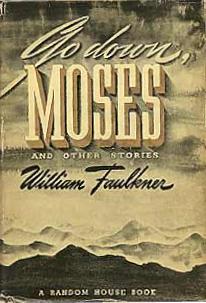
Go Down, Moses is a 1942 collection of seven related pieces of short fiction by American author William Faulkner, sometimes considered a novel. The most prominent character and unifying voice is that of Isaac McCaslin, "Uncle Ike", who will live to be an old man; "uncle to half a county and father to no one". Though originally published as a short story collection, Faulkner considered the book to be a novel in the same way The Unvanquished is considered a novel. Because of this, most editions no longer print "and other stories" in the title.

Tortilla Flat (1935) is an early John Steinbeck novel set in Monterey, California. The novel was the author's first clear critical and commercial success.

The Old Bushmills Distillery is an Irish whiskey distillery in Bushmills, County Antrim, Northern Ireland, established in 1784 and owned by Proximo Spirits. Bushmills Distillery uses water drawn from Saint Columb's Rill, which is a tributary of the River Bush. The distillery is a popular tourist attraction, with around 120,000 visitors per year. It produces the Bushmills brand of Irish whiskey.

The tequila sunrise is a cocktail made of tequila, orange juice, and grenadine syrup. The drink is served unmixed in a tall glass. The modern drink originates from Sausalito, California, in the early 1970s after an earlier iteration created in the 1930s in Phoenix, Arizona. The cocktail is named for its appearance when served—with gradations of color resembling an inverted sunrise.
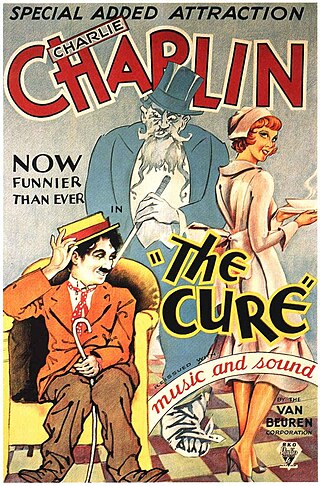
The Cure is a 1917 short comedy film written and directed by Charlie Chaplin. The plot revolves around alcohol, being made just prior to prohibition but during a period where the politicians were debating the evils of alcohol.
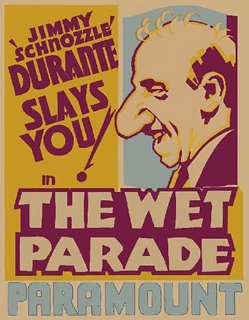
The Wet Parade is a 1932 American pre-Code drama film directed by Victor Fleming and starring Robert Young, Myrna Loy, Walter Huston, Lewis Stone and Jimmy Durante. It is based on the 1931 novel by Upton Sinclair. The film shows how two families are devastated by the effects of alcohol consumption and Prohibition. In addition to the main story, many small vignettes illustrate the theme, such as a three-minute segment that documents the many steps in the creation of counterfeit imported liquor. When the film was released in March 1932, Prohibition had been law for almost 13 years and would not end until December 5, 1933 with the passage of the 21st Amendment.
To Be Called For is a 1914 American silent short comedy directed by Francis J. Grandon and written by Wallace C. Clifton. The film stars Earle Foxe and Adda Gleason in the main roles.

"Whiskey Lullaby" is a song written by Bill Anderson and Jon Randall. The song was a duet recorded by American country music artist Brad Paisley and bluegrass artist Alison Krauss on Paisley's album Mud on the Tires. The song was released on March 29, 2004, as the album's third single, and the 11th chart single of Paisley's career. Whiskey Lullaby peaked at No. 3 on the Billboard Hot Country Singles & Tracks charts, and No. 41 on the Billboard Hot 100. The song won the 2005 Country Music Association Song of the Year Award. It was certified 2× Platinum by the Recording Industry Association of America.
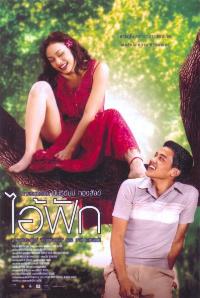
Ai-Fak is a 2004 Thai drama film. It is based on the S.E.A. Write Award-winning novel by Chart Korbjitti, Khamphiphaksa.
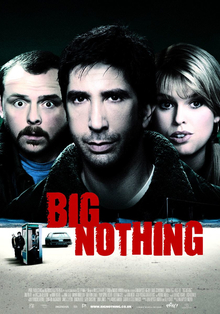
Big Nothing is a 2006 black comedy crime film directed by Jean-Baptiste Andrea, starring David Schwimmer, Simon Pegg and Alice Eve. It had its world premiere at the Cardiff Film Festival on 18 November 2006, and was released in the United Kingdom on 1 December 2006.

Old Grand-Dad is a brand of bourbon whiskey distilled at the Jim Beam distillery in Clermont, Kentucky. The brand was created by Raymond B. Hayden and named after his grandfather Meredith Basil Hayden Sr., who was a well known distiller during his lifetime. A fanciful portrait of Hayden Sr. is depicted on the front of each bottle. Today, it is owned and produced by Suntory Global Spirits.

The Frozen North is a 1922 American short comedy film directed by and starring Buster Keaton. The film is a parody of early western films, especially those of William S. Hart. The film was written by Keaton and Edward F. Cline. The film runs for around 17 minutes. Sybil Seely and Bonnie Hill co-star in the film.

Red Lights is a 2004 French thriller film directed by Cédric Kahn. It was adapted from the eponymous 1955 Georges Simenon novel set in the Northeastern United States. The film is set in modern-day France.

That Devil, Bateese is a 1918 American silent action-drama film directed by William Wolbert and starring Monroe Salisbury, Ada Gleason, and Lon Chaney. The screenplay was written by Bernard McConville, based on a story written by Bess Meredyth. Even though this film was released before some of his earlier Universal films, it was actually Chaney's final film from his first stint at Universal Studios. Filming took place at Big Bear Lake and the San Bernardino National Forest in California. The film is considered lost.

Out of an Old Man's Head is a 1968 Swedish comedy-drama film directed by Per Åhlin and Tage Danielsson, starring Hans Alfredson as an old man remembering his past. Partly a black comedy, the film was released around the same time as the urban renewal of the Klara quarters in Stockholm, and could be seen as a comment both on the demolishing of the old buildings and on the welfare state in general.
"Over" is the tenth episode of the second season of the American television action drama series Breaking Bad. It was written by Moira Walley-Beckett and directed by Phil Abraham. The episode aired on AMC on May 10, 2009.

Gentleman's Fate is a 1931 American pre-Code drama film directed by Mervyn LeRoy and written by Leonard Praskins. The film stars John Gilbert, Louis Wolheim, Leila Hyams, Anita Page, and Marie Prevost. The film was released on March 7, 1931, by Metro-Goldwyn-Mayer, just seventeen days after Wolheim's untimely death.

Delirium in a Studio was a 1907 French silent trick film by Georges Méliès. It was sold by Méliès's Star Film Company and is numbered 1014–1017 in its catalogues. A fragment of the film survives.

















